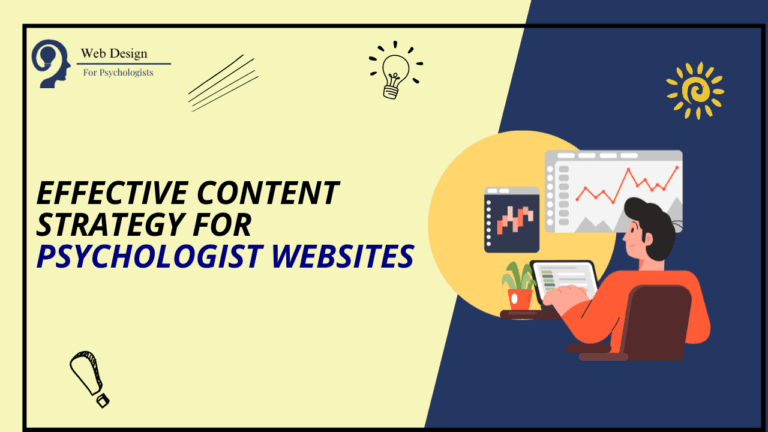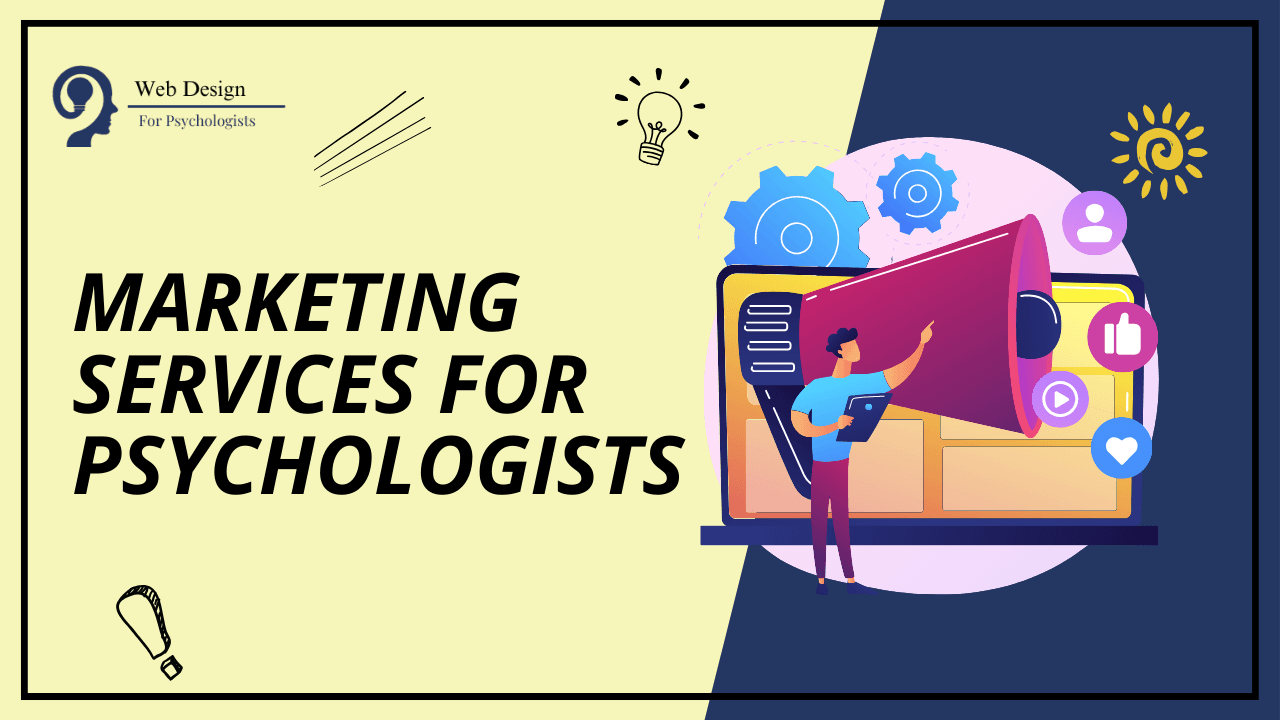In the digital age, having a well-crafted content strategy is crucial for any professional service, and psychology practices are no exception. An effective content strategy for psychologist websites can help build credibility, attract and retain clients, and communicate the unique value and expertise of the practice. This article will delve into the essential components of a successful content strategy, including content planning, the use of engaging visuals, and writing expert copy.
Content Strategy for Psychologist Websites

- Understanding Your Audience:
The first step in content planning is understanding your target audience. For psychologists, this means identifying the demographics, needs, and concerns of your potential clients. Consider the types of issues they might be facing—such as anxiety, depression, relationship problems, or stress management—and tailor your content to address these concerns. - Setting Goals:
Clear, measurable goals will guide your content strategy. Are you looking to increase website traffic, boost engagement, or convert visitors into clients? Your goals will determine the type of content you create and how you measure success. - Creating a Content Calendar:
A content calendar helps you plan and organize your content effectively. It ensures that you have a consistent flow of new material and that your topics are relevant and timely. Include a mix of blog posts, articles, videos, and social media updates to keep your audience engaged. - Keyword Research:
Identify relevant keywords that potential clients might use to find psychological services. Incorporate these keywords naturally into your content to improve your search engine ranking. Tools like Google Keyword Planner or SEMrush can help you find the best keywords to target. - Diversifying Content Types:
Different people consume content in different ways. Some prefer reading articles, while others might find videos or infographics more engaging. Diversify your content to cater to various preferences. Consider including blog posts, case studies, client testimonials, video content, and downloadable resources like e-books or guides.
Engaging Visuals for Psychologist Websites
- The Power of Visuals:
Visual content can significantly enhance the appeal and effectiveness of your website. It helps break up text, making your content more digestible and engaging. Moreover, visuals can convey complex information quickly and clearly. - Types of Visual Content:
- Images: Use high-quality images that resonate with your audience. Stock photos can be useful, but personalized photos of your practice, team, and therapy environment can create a more authentic connection.
- Infographics: Infographics are a great way to present data or processes visually. They can simplify complex psychological concepts and make your content more shareable.
- Videos: Videos can be particularly powerful in showcasing your expertise and building trust. Consider creating introductory videos, client testimonials, or short explainer videos on common psychological issues.
- Animations and Illustrations: These can add a unique touch to your content, making it more engaging and easier to understand. They are particularly useful for explaining abstract concepts or processes.
- Optimizing Visuals for SEO:
Ensure that your visuals are optimized for search engines. Use descriptive file names and alt text that include relevant keywords. This not only helps with SEO but also makes your website more accessible. - Balancing Visuals and Text:
While visuals are important, they should complement rather than overshadow your text content. Aim for a balance that keeps your audience engaged without overwhelming them. Use visuals to support and enhance your written content.
Writing Expert Copy for Psychologist Services
- Establishing Authority and Trust: Your copy should convey your expertise and build trust with potential clients. Highlight your qualifications, experience, and the unique approach you bring to your practice. Use a professional yet approachable tone to make your website welcoming.
- Clear and Compelling Headlines: Headlines are crucial as they are often the first thing visitors see. Make sure your headlines are clear, compelling, and incorporate relevant keywords. They should immediately communicate the value of your content and encourage visitors to read more.
- Focus on Benefits: When describing your services, focus on the benefits to the client rather than just the features. Explain how your services can improve their lives, help them overcome challenges, and achieve their goals.
- Using Testimonials and Case Studies: Client testimonials and case studies are powerful tools for building credibility. They provide social proof and demonstrate the real-world impact of your services. Ensure you have permission from clients to share their stories and anonymize details as necessary.
- Crafting Clear Calls to Action: Every page on your website should have a clear call to action (CTA). Whether it’s encouraging visitors to schedule an appointment, sign up for a newsletter, or download a resource, make sure your CTAs are prominent and persuasive.
- Maintaining Clarity and Readability: Psychological topics can be complex, but your website copy should be clear and easy to understand. Avoid jargon and use plain language. Break up text with headings, bullet points, and short paragraphs to enhance readability.
Integrating SEO Best Practices

- On-Page SEO:
Ensure that your content is optimized for search engines. This includes using relevant keywords in your titles, headers, and body text, as well as optimizing meta descriptions and URLs. Internal linking to other pages on your site can also improve SEO. - Off-Page SEO:
Build backlinks to your website by contributing guest posts to reputable psychology blogs, participating in online forums, and engaging with the online psychology community. Social media can also drive traffic to your site and improve your search engine ranking. - Regularly Updating Content:
Search engines favor websites that are regularly updated. Keep your content fresh by adding new blog posts, updating existing pages, and removing outdated information. Regular updates show that your website is active and relevant.
Measuring and Analyzing Performance
- Setting Up Analytics: Use tools like Google Analytics to track the performance of your website. Monitor metrics such as page views, bounce rate, and average session duration to understand how visitors are interacting with your content.
- Analyzing User Behavior: Analyze user behavior to identify which content is most popular and where visitors are dropping off. This can help you refine your content strategy and improve user experience.
- Adjusting Your Strategy: Based on your analysis, adjust your content strategy to better meet the needs of your audience. This might involve creating more of a certain type of content, tweaking your SEO approach, or improving site navigation.
Conclusion
An effective content strategy for psychologist websites involves careful planning, the use of engaging visuals, and writing expert copy that resonates with your audience. By understanding your audience, setting clear goals, and diversifying your content, you can create a website that not only attracts visitors but also converts them into clients. Incorporating visuals and optimizing your content for SEO further enhances your online presence, while regular analysis and updates ensure that your strategy remains effective over time.
Implementing these strategies will help you build a strong online presence, establish your authority, and ultimately grow your practice by connecting with those who need your services the most.




